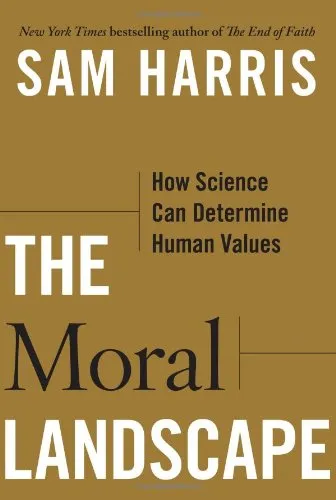The Moral Landscape: How Science Can Determine Human Values
4.0
Reviews from our users

You Can Ask your questions from this book's AI after Login
Each download or ask from book AI costs 2 points. To earn more free points, please visit the Points Guide Page and complete some valuable actions.Related Refrences:
Introduction to The Moral Landscape: How Science Can Determine Human Values
In "The Moral Landscape: How Science Can Determine Human Values," Sam Harris embarks on a profound exploration of the relationship between science and human values. In this groundbreaking book, Harris argues that science can, and should, be an authority in ethical debates, proposing a new paradigm in which moral truths exist on a continuum of well-being that human reasoning can discover.
Summary of the Book
The traditional belief that science and morality are distinct realms is a central challenge that Harris addresses in "The Moral Landscape." Harris posits that the dichotomy is a false one, claiming that the same empirical rigor applied in scientific inquiry can likewise illuminate questions of morality. He introduces the concept of "the moral landscape," which represents a multitude of experiences that contribute to human and animal well-being.
Harris articulates that moral questions are not an exception to scientific methods. Instead, they are fundamentally questions about the well-being of conscious creatures. He argues that there are objectively right and wrong answers to these questions based on how actions contribute to the heightening or diminishing of well-being. In his view, moral relativism—where morality is seen as culturally dependent or subjective—is inadequate for the modern world, where universal human rights and global ethical standards are increasingly vital.
Key Takeaways
- Morality should be grounded in the sciences, particularly those that pertain to understanding human well-being, such as neuroscience and psychology.
- Moral relativism is insufficient in addressing global ethical challenges; there are right and wrong answers in moral discussions.
- The concept of a "moral landscape" suggests multiple peaks and valleys, representing the range of human experiences from suffering to flourishing. These moral terrains are accessible and discoverable through human inquiry.
- Evolving scientific understanding across disciplines can contribute to resolving ethical issues, much like they resolve debates in medical or environmental fields.
Famous Quotes from the Book
"The separation between science and human values is an illusion, and the moral landscape exists within scientific reach."
"Morality should be seen, in part, in light of the consequences of our actions on the well-being of conscious creatures."
Why This Book Matters
In a rapidly globalizing world fraught with ethical dilemmas, ranging from technological advancement to socio-political crises, "The Moral Landscape" offers a revolutionary framework for considering moral issues. Harris contends that by relying on scientific insight, humanity can achieve a more coherent and universal structure of ethics, dismissing the antiquated boundaries that have traditionally kept science and morality separate.
This book matters because it challenges both the layperson and the scholar to rethink how we establish ethical norms and create societal values. By providing a scientific approach to questions of right and wrong, Harris ignites a necessary dialogue about how humanity can leverage knowledge to heighten collective well-being. This paradigm shift is crucial to navigating an interconnected world encountering unprecedented challenges and opportunities.
Free Direct Download
You Can Download this book after Login
Accessing books through legal platforms and public libraries not only supports the rights of authors and publishers but also contributes to the sustainability of reading culture. Before downloading, please take a moment to consider these options.
Find this book on other platforms:
WorldCat helps you find books in libraries worldwide.
See ratings, reviews, and discussions on Goodreads.
Find and buy rare or used books on AbeBooks.
1333
بازدید4.0
امتیاز50
نظر98%
رضایتReviews:
4.0
Based on 0 users review
"کیفیت چاپ عالی بود، خیلی راضیام"
Questions & Answers
Ask questions about this book or help others by answering
No questions yet. Be the first to ask!



